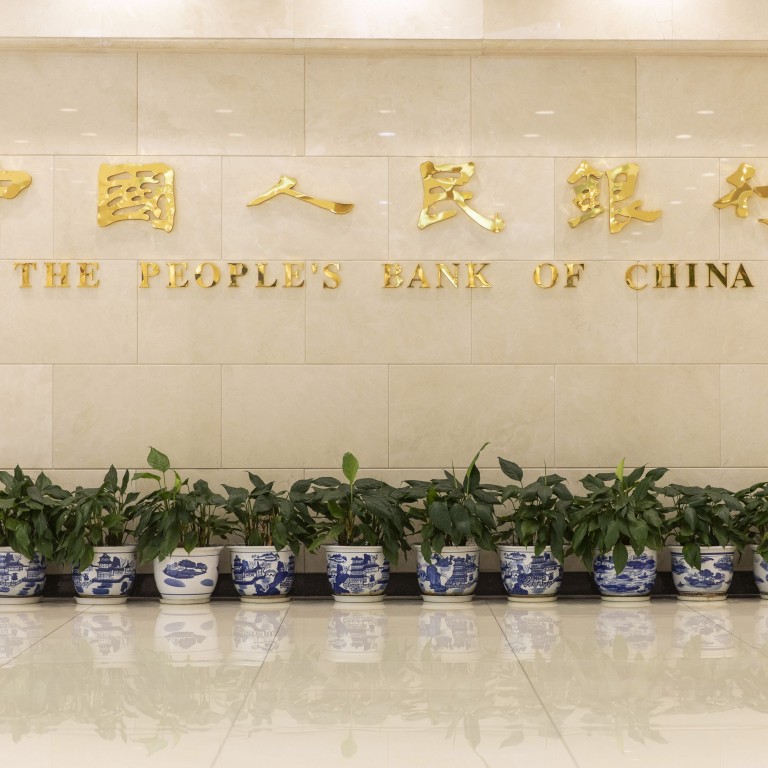
Chinese banks rejected nearly US$144 billion in loans last year using credit scoring system, central bank says
- People’s Bank of China highlights deleveraging campaign in bid to reduce high debt and risky lending after Chinese banks blocked 1 trillion yuan of lending in 2018
- Bank also received alerts on outstanding ‘high risk’ loans and also collected non-performing loans
Chinese banks used the government’s new centralised credit scoring system to reject loan applications worth nearly 1 trillion yuan (US$144 billion) last year, the People’s Bank of China reported Friday, showcasing that its deleveraging campaign to reduce high debt and risky lending is succeeding.
In total, 21 banking institutions rejected loan applications worth 911.7 billion yuan (US$131.7 billion) from “high risk” customers, while also receiving alerts on outstanding “high risk” loans worth 1.301 trillion yuan (US$188 billion) and collecting 159.4 billion yuan (US$23 billion) worth of non-performing loans, The People’s Bank of China (PBOC) said. The central bank did not specify whether the loans were from consumers or business clients, although the credit scoring system covers both.
It plans to expand the credit scoring system and the quality of information it contains to allow banks to make even better judgments about a clients’ risk. It is also intending to provide information that may be difficult for banks find themselves regarding credit histories so that they can increase lending to small and micro businesses.
In response to the rapid rise in risky lending over the past decade, as well as the sharp acceleration of internet-based lending in recent years, China has been building an increasingly comprehensive consumer credit reporting system that includes information collected from foreign firms.

Last year, the country launched a new consumer credit bureau, Baihang Credit Scoring, to support the established government-run credit reporting service, the Credit Reference Centre, a unit under the central bank, to facilitate data collection and information sharing among participating lenders.
The enterprise credit information system includes data on 13.7 million small and micro businesses, accounting for 53 per cent of all firms, according to the central bank. At present, there are nearly 26 million enterprises included in the credit information system. Among them, 3.71 million small and micro enterprises have obtained credit support, with the total amount of outstanding loans reaching 33 trillion yuan (US$4.8 trillion), data from the central bank showed.
As Beijing battles soaring corporate and personal debt levels, the aim of the project is to develop a credit rating system similar to those used in other countries.
Guo Shuqing, chairman of the China Banking and Insurance Regulatory Commission, stressed on Thursday that China needs to continue to be vigilant about financial risks. China’s overall debt, estimated by some analysts to be nearly 250 per cent of its overall gross domestic product, despite efforts to clamp down on shadow banking, a non-regulated lending channel targeting the private sector firms who often struggle to obtain loans from state banks.
Some market-based credit reporting institutions have innovated the micro-enterprise credit information service model, using alternative data to solve banks’ problems [with data], and helping small and micro enterprises to obtain loans without the backing by assets
Zhu Hexin, deputy governor of the PBOC, believes that the credit reporting system could help to fill gaps in credit histories among lenders, helping small firms to more easily have loan applications approved. China allows both overseas and local credit information firms to participate in the nationwide credit information monitoring system, prompting interest from analytics company Dun & Bradstreet and credit reporting company Experian.
“Some market-based credit reporting institutions have innovated the micro-enterprise credit information service model, using alternative data to solve banks’ problems [with data], and helping small and micro enterprises to obtain loans without the backing by assets,” said Zhu.
The government will expand the credit reporting system to cover the Greater Bay Area in southern China which also includes Hong Kong and Macau, according to Wan Cunzhi, the director general of the PBOC’s Credit Information System Bureau.
“Recently, the People's Bank of China and the Hong Kong Monetary Authority have been closely communicating regarding cooperation in credit information collection in Hong Kong and Macau,” said Wan on Friday. “We have to design some frameworks, formulate some systems, and establish market service mechanisms.
“There is an urgent need for cross-border cooperation in the Greater Bay Area of Guangdong, Hong Kong and Macau. Some work will be carried out gradually in the near future.”
As long as firms or individuals are borrowing from mainland China's lending institutions, either domestic or foreign, they will be included in the credit information system, according to Wang Xiaolei, deputy head of the PBOC Credit Reference Centre.
According to Chinese law, information collected by the credit reporting agency, whether it is personal or corporate in nature, can only be stored in China and can only be processed within China, Wan said when asked whether the credit information will be shared with other countries.
“The cross-border flow of information between developed countries in Europe and America is highly sensitive and highly complex,” added Wan. “This is a very good topic and we are also exploring it.”

